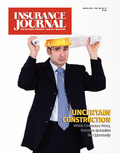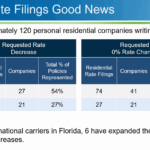Auto insurance reforms to eliminate third-party, bad-faith action and limit financial obligations of joint defendants to the percentage of their liability will soon be introduced to the West Virginia Legislature by Gov. Joe Manchin III according to Carte Goodwin, the governor’s general counsel.
Goodwin said the governor has received commitments from insurance companies that rates would decrease by as much as $100 per vehicle within 90 days after the bill passes and estimated that motorists would save as much as $50 million on auto insurance premiums. Savings estimates are disputed, however, by some lawmakers who aren’t sure any significant savings would result.
Delegate J.D. Beane, D-Wood, and Sen. Donna Boley, R-Pleasants, told the Parkersburg News and Sentinel that many lawmakers are concerned about whether state residents would actually see in difference in insurance costs.
“It’s more and less a gentleman’s agreement,” Beane said. “Look, if the industry wants us to change the law and they can’t put it in writing, what assurances do we have that they will lower rates? We don’t believe it, we want to make sure if we do make any changes that we see some positive reduction people can realize.”
Beane said he had some reservations and that there is much to be considered when tackling the problem of insurance rates.
“Third party needs to be looked at and maybe changed, but I don’t know that I favor elimination. I don’t think that (third-party suits) are a significant amount in payoff claims,” he said.
The governor’s proposal would eliminate third-party, “bad faith” lawsuits, where an insurance carrier can be sued if the claimant doesn’t believe the company is negotiating in good faith to settle a claim. Goodwin said the suits are often used as leverage when negotiating a settlement.
West Virginia is one of five states which allow the third-party, bad-faith action, Goodwin said. Under the proposal, such claims of bad faith would be ruled upon in an Insurance Commissioner’s Office hearing instead of the courts, he said.
In cases with multiple defendants, Manchin’s proposal would limit defendants’ financial obligations to the percentage of fault determined by the courts, Goodwin said.
The proposal also would require insurance companies to report rates every six months for a period of four years, so changes can be monitored, Goodwin said.
Of the five states bordering West Virginia, only Kentucky typically has a higher average paid per claim and higher auto insurance premiums and the difference in rates is especially noticeable in border counties, according to a report from the West Virginia Insurance Commissioner’s Office. According to the state report, the average auto insurance premium in Marietta is about 40 percent lower than in Parkersburg.
According to an Insurance Information Institute report, the average auto insurance expenditure in West Virginia was $706 in 2001, compared to $680 the year before. Ohio’s average expenditure was $642 in 2001 and $579 in 2000, it says.
The average payout for a bodily injury claim in West Virginia during 2002 was $14,000, 45 percent higher than the national average, the insurance commissions report says. That difference was more pronounced in 2000, with the average bodily injury claim paid in West Virginia being 56 percent above national average, the report says.
From 1998 to 2002, the bodily injury settlement average in West Virginia was 37 percent higher than the national average, according to the report.
Was this article valuable?
Here are more articles you may enjoy.


 Slide’s Exec Pay Leads to Questions About Florida Citizens’ Rate Model
Slide’s Exec Pay Leads to Questions About Florida Citizens’ Rate Model  Erie Insurance Restores Online Access for Customers; Still Working on Other Systems
Erie Insurance Restores Online Access for Customers; Still Working on Other Systems  Truckers Fear Job Loss as New English Language Rules Take Effect
Truckers Fear Job Loss as New English Language Rules Take Effect  Lloyd’s Applauds Removal of Section 899 Tax Measure From ‘One Big Beautiful Bill’
Lloyd’s Applauds Removal of Section 899 Tax Measure From ‘One Big Beautiful Bill’ 

